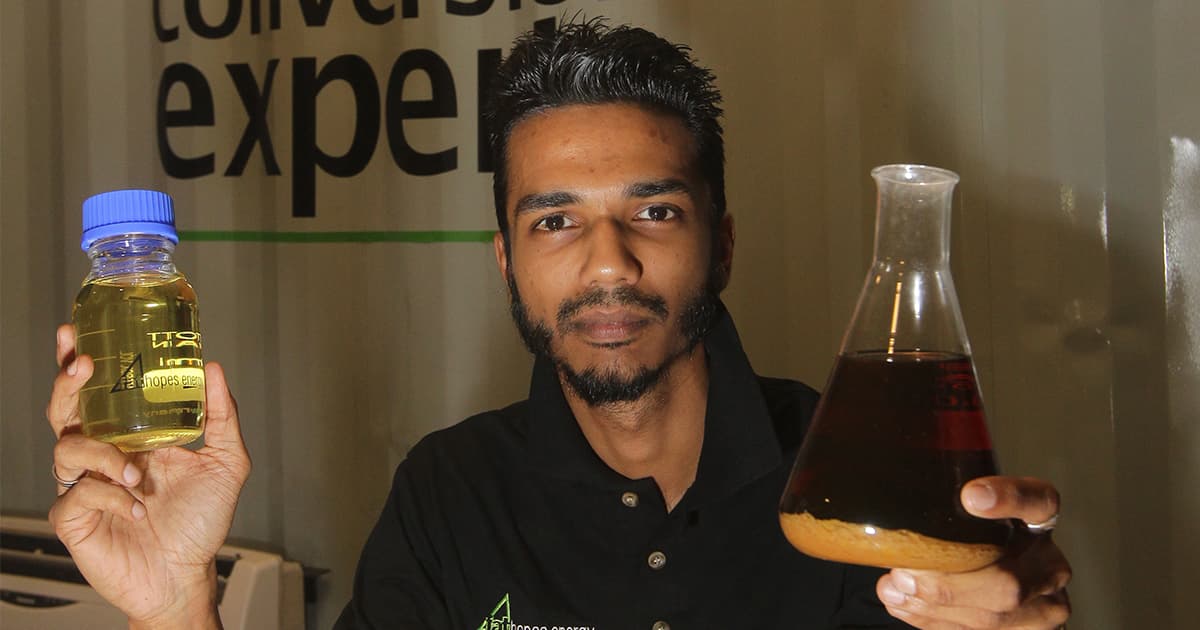
The idea of running a business that converts waste oil to biodiesel sounds relatively simple. Just collect waste oil from restaurants, send it to be purified and converted into biodiesel, then deliver it to the buyers. But in reality, the logistical issues that crop up in the process can be very difficult for businesses to handle.
FatHopes Energy Sdn Bhd founder and CEO Vinesh Sinha went through that experience when he founded the company in 2010. Back then, he dropped out of university to start the company after he figured out how to convert waste oil into biodiesel, which emits 70% less carbon emissions than conventional diesel, in his kitchen.
At first, he was only planning to purify waste oil and rely on suppliers to provide the raw material. But soon, he realised it was not a reliable option.
"The people who were collecting waste oil were disorganised. The effort was not consolidated or ran professionally. So three years into our business, we pivoted and began to do waste oil collection on our own," says Vinesh.
That's when the logistical issues began. Every morning, the office will assign drivers to pick up waste oil from various locations. But they did not know whether these locations have any waste oil at any point in time.
"Whether the shop had anything to be collected, the drivers had to go, which means some trucks will come back with 300kg of waste oil and others with 2,000 kg at the end of the day," he says.
At every location, the driver also has to handle collection chits. For FatHopes to obtain international certifications, the company needs to maintain a stringent trail of documentation. So once the driver receives the waste oil, the supplier (outlet) will need to sign off on the chit and keep a copy of it.
"The driver will bring the chit back to the local office, who compiles all of it at the end of the month and couriers it to us [the headquarters]. If one chit goes missing, the whole company becomes chaotic," says Vinesh.
Based on the chits, every month, the outlets will review the total amount of waste oil supplied to FatHopes and issue an invoice. If the supplier's numbers tallies with FatHopes', the payment process can proceed. But if there are errors or missing chits, the process is delayed.
That's when Vinesh decided to look for digital solutions to solve the issues. In 2013, he installed remote monitoring sensing technology in all their collection points. These sensors will send real-time updates about the amount of waste oil in the location. With this information, FatHopes can send drivers only to locations that have waste oil to be collected.
This is also how Maxis' Mobile Workforce solution comes into play. While FatHopes now has real-time updates on its collection points, how can they convey it to their fleet of drivers? The company decided to use Mobile Workforce to create an automated process where information in the central system will be pushed out to drivers in real-time.
"Before this, if we find out at mid-day that a tank is full, we can only go pick it up tomorrow. But today, in 10 minutes or less, a driver will receive a push notification that a new collection point has to be serviced. This augurs well during festive and peak seasons because of the volume coming through the outlets," says Vinesh.
Mobile Workforce is an easy-to-use workforce management solution to digitalise forms, assign and monitor tasks to employees and keep track of staff attendance and location in the field.
FatHopes also no longer has any physical collection chits. Instead, it has a system in the Mobile Workforce solution that is connected to its sensors. When their drivers issue the chit, they no longer have to estimate how much waste oil is in the tank. The sensor immediately informs the system of the exact information.
"The driver just needs the manager to sign the chit and the outlet receives a copy immediately, as do we and the outlet's headquarters. By the end of the month, everything is tallied by the system and we have the invoice by the second day of the next month. This has shortened the process and increased integrity and trust in the system," says Vinesh.
Going digital has increased FatHopes' business efficiency and increased transparency in the process.
"As we scale the business, trust and integrity becomes important, even more so than profitability. We can be profitable but if we're not trustworthy, our profitability will disappear… We have come to a point where if you can't prove to the big oil companies [in Europe that buy biodiesel] where you get your waste oil from, they won't buy from you," says Vinesh.
Now, FatHopes has seven office locations across Malaysia and Singapore. It exports most of its biodiesel to European countries. Locally, it works with McDonald's Malaysia by converting the fast food chain's waste oil into biodiesel, which in turn fuels McDonald's dispatch trucks.
One major reason Vinesh chose Maxis' solution is because of the telecommunications company's wide reach across the country. The solution is also very customisable.
"So far, there has been nothing my operational control centre has asked for that they cannot accommodate. [Now] We're working on integrating QR codes into the system. The idea is to give the managers a QR code instead of a signature," says Vinesh.

— Claire Featherstone, Head of Enterprise Practices, Maxis
For more details on how Maxis solutions can help your business grow, click here